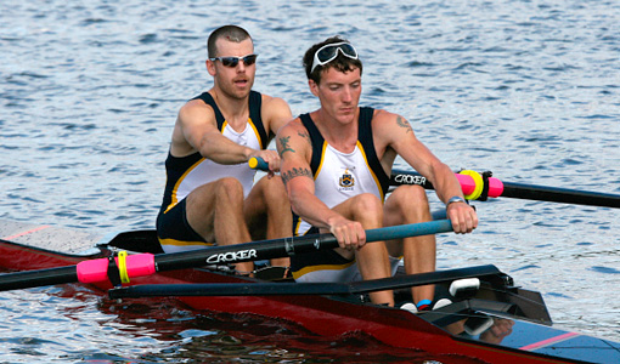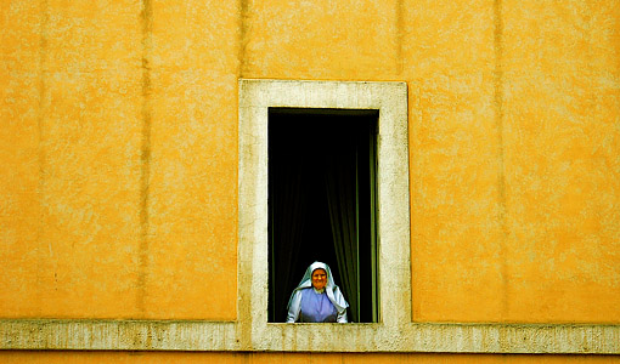Never heard of Craig Dodson? He is possibly the most remarkable and resilient St. Thomas attraction to come from Mankato since Kasota stone.
A St. Thomas undergraduate, graduate student and admissions counselor, Dodson is making a splash nationally in the sport of rowing. Earlier last year, he won three events at nationals and also placed second in a race at the U.S. Trials for the 2007 World Champion-ships. His résumé lists seven first-place finishes in U.S. national competitions (two- or four-man boats), and since 2003 he has earned 14 top-two finishes in regional or national races.
“Craig’s gone from a skinny, 18-year-old athlete when he started the sport, to a threatening athlete,” said fellow Tommie James Dundon ’90, a skilled rower and mentor to Dodson. “He’s an amazing competitor. It’s like he was born to do it.”
A journey that started so modestly is approaching a crossroads. Dodson turns 30 in 2008 and hopes to celebrate by representing the United States at the Olympic Games in Beijing or at the World Championships.
Not bad for a guy whose best sport as a teenager was downhill skiing. It’s especially notable for someone whose rowing skills weren’t developed in an elite Ivy League program, but in St. Thomas’ fun but no-frills world of club sports.
Officially, Dodson competes in Lightweight two-man and four-man rowing. But this Lightweight is no lightweight. He became a lean, mean, training machine during his St. Thomas undergrad and graduate-school days and continues to make impressive strides each year.
“I’ve always been really competitive,” Dodson said. “I was always good at different things, but never great at any one sport. My main sport in high school was skiing, and I did a lot of sports recreationally.
“One of my (high school) skiing teammates was on the rowing team at St. Thomas. She told me how much she loved it. So I went out for the team and fell in love with it.”
Dodson said the less structured nature of St. Thomas crew was actually a blessing.
“UST rowing gave me a chance to compete and learn the sport,” he explained. “I didn’t have the athleticism then to make one of the big varsity programs like a Wisconsin, Yale or Harvard. Now I have developed that ability. St. Thomas’ team took a lot of guys from different backgrounds and put them together and allowed them to excel. We beat a lot of Division I programs and tended to outperform bigger teams. We had a lot of fun and trained really hard.”
With fewer team members, Dodson said the Tommies regularly competed against the Heavyweight class. So instead of racing other 160-pounders, they often had to stroke against 180- to 200-pound rowers.
“We had to be very technical to compete with the bigger, heavier guys,” Dodson said. “Looking back, I’m really thankful to be part of a smaller program and have that focus on mastering our technique. That helped me have a chance to compete at the national level today. As a post-collegian, you can pick up the fitness [component], but the technical part takes a lot longer to master.”
Dundon agreed that St. Thomas provided a good launching point for his friend. “In only one of the four years that Craig competed at St. Thomas did [the Crew Team] have an experienced head coach,” he said. “Craig and the guys just figured it out on their own. They were just hard-working and driven to succeed, even without that support. They loved rowing, and they loved competing together. It pushed Craig to discover something exceptional deep inside him.”
After getting his undergraduate degree in criminal justice in 2000, Dodson enrolled in graduate school at St. Thomas and landed a full-time job at the university. He also continued to train and compete with the Minneapolis Rowing Club. He received his master’s degree in educational leadership in 2004, which moved him closer to his long-term professional goal to work in student affairs.
But those dreams had to wait. In 2004 he made a bold decision to move out east where he could change his routine and challenge the world.
“I moved to Philadelphia because it’s known as the “go-to” place for elite rowing,” Dodson said. “It has the highest percentage of training teams and sites. It has the most optimal weather of the four northern hotbeds for rowers. Washington, D.C., gets too hot in the summer, and New York City and Boston get too cold and are a lot like the Twin Cities. You can usually be on the water about 11 months of the year in a normal year in Philadelphia.”
With wife Andrea Bjornberg ’01 along for the adventure, Dodson headed for Philadelphia. He didn’t have the luxury of full-time training, though. He took a job on the admissions staff at Philadelphia Community College. About 18 months later, he was hired at LaSalle University, and now is the associate dean of admissions. Andrea works in the human relations department at Comcast’s national headquarters in Philadelphia.
“When you’re an amateur athlete, you’re not paid millions of dollars like some professionals,” Dodson said. “So you have to work full time and still find time to get in four to six hours of workouts a day.
“The biggest sacrifice we’ve made is picking up our entire lives and moving 1,200 miles away from our family and all of our friends. Obviously, the bigger sacrifice has come on my wife’s part. We don’t have the same lifestyle now as the typical 20-somethings. We don’t take vacations, and I’m usually going to bed by 9:30 each night because I have early-morning workouts six to seven days a week.”
Dodson trains year-round with the Undine Barge Club. “There are eight of us on my team, and most of us are between ages 25 and 33 years old.”
Specifically, Dodson must combine the technique of a sprinter, the explosiveness of a shot putter and the endurance of a marathoner … and find a racing partner who brings out his best.
“You’re in a boat that’s 29 feet long and two feet wide,” Dodson explained. “You have to maintain your balance, be patient, stay relaxed and concentrate to be as efficient as you can. Then the endurance and fitness part comes in as you have to maintain that intense pace.
“In spring, summer and early fall we’re on the water about twice a day. Winter training involves more cross training, weight training, rowing machines and indoor cycling. As important as fitness is, it’s also important on the mental side to get a break from that routine in the winter.
“Diet is one of the important things and has become much more of a focus for me. You have to count every calorie. I eat at very specific times and eat a lot of protein. I generally burn about 5,000 to 6,000 calories a day with two or three workouts a day. I naturally sit just over 160 pounds and trim weight for competitions.”
Dodson won a U.S. national title in 2005 and 2006, and in 2007 enjoyed his best year yet, with three firsts at the national meet and a second-place in the U.S. Trials for the World Championship.
“That definitely was a breakthrough race,” he said. “We finished just a couple of seconds behind the winning team, and they were guys who had been in several national championships and were pretty outstanding athletes. That put us one step closer to our goal.”
“Craig just keeps improving every year,” Dundon said. “Perseverance is his greatest asset. He absolutely deplores losing. He’s definitely one of the top Lightweight rowers in the country, with a very real shot to make the national team or the Olympic team.”
The Olympic racing distance is a 2,000-meter course (about 1.25 miles). Dodson’s main push in 2008 will be Lightweight doubles, where both members each use two oars. “The Olympic time for this event is about 6:20, and I’m definitely in that range,” he said. “My fitness and times aren’t exactly there right now, but I think they can be this spring after I taper and shoot for a peak.”
Dodson estimated that 30 to 40 elite rowers will be competing for six spots in the Lightweight category (one doubles team, one four-man team). In all, about 50 male and female Lightweight and Heavyweight rowers will become 2008 U.S. Olympians.
Whatever happens in 2008 and beyond, Dodson said he’s proud of how far he’s come.
“I consider myself pretty lucky,” he said. “From when I took my first strokes in the Mississippi River as a freshman at St. Thomas and you fast forward to 2007, I absolutely never expected I’d be competing at this high level. I never thought I’d be at the top of my game and compete against some of the top athletes in this country and against some top athletes from Canada and Mexico, too.
“No matter what the outcome when I decide to retire, I’ve had an amazing run. The biggest thing for me when I look back is that I just don’t want to have any regrets. I want to be able to say I put everything out on the line and can feel good about what I accomplished.”
Dodson also hopes he can carry over his passion for rowing to his post-competition years.
“I can certainly see myself coaching in some capacity after I retire from elite competition,” he said. “The sport is too much of my life, in my blood too much, to just walk away from it. My wife and I intend to move back to the Twin Cities, and I’d love to see what I can do to help develop rowing more in Twin Cities-area high schools and colleges. I plan to get back involved with the UST Crew Team more when I return and do whatever I can to coach or support the Tommie rowers.
“Beyond that, I intend to keep rowing for the rest of my life. It’s simply great exercise. I feel the peace and release from everything going on in life when I’m out on the river on perfect water. When you’re out there when the sun is rising on a misty day, there is nothing better.”







